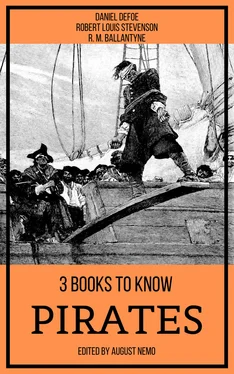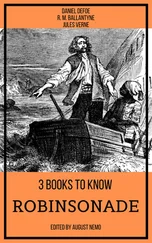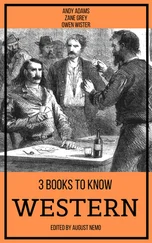Again, at this time Jack and I pondered the formation of the large coral islands. We could now understand how the low ones were formed; but the larger islands cost us much consideration, yet we could arrive at no certain conclusion on the subject.
Having satisfied our curiosity, and enjoyed ourselves during the whole day in our little boat, we returned, somewhat wearied, and withal rather hungry, to our bower.
“Now,” said Jack, “as our boat answers so well we will get a mast and sail made immediately.”
“So we will!” cried Peterkin as we all assisted to drag the boat above high-water mark. “We’ll light our candle and set about it this very night. Hurrah, my boys, pull away!”
As we dragged our boat, we observed that she grated heavily on her keel; and as the sands were in this place mingled with broken coral rocks, we saw portions of the wood being scraped off.
“Hallo!” cried Jack on seeing this, “that won’t do. Our keel will be worn off in no time at this rate.”
“So it will,” said I, pondering deeply as to how this might be prevented. But I am not of a mechanical turn naturally, so I could conceive no remedy save that of putting a plate of iron on the keel; but as we had no iron, I knew not what was to be done. “It seems to me, Jack,” I added, “that it is impossible to prevent the keel being worn off thus.”
“Impossible?” cried Peterkin. “My dear Ralph, you are mistaken; there is nothing so easy.”
“How?” I inquired in some surprise.
“Why, by not using the boat at all!” replied Peterkin.
“Hold your impudent tongue, Peterkin!” said Jack as he shouldered the oars. “Come along with me, and I’ll give you work to do. In the first place, you will go and collect coca-nut fibre, and set to work to make sewing-twine with it —”
“Please, captain,” interrupted Peterkin, “I’ve got lots of it made already — more than enough, as a little friend of mine used to be in the habit of saying every day after dinner.”
“Very well,” continued Jack; “then you’ll help Ralph to collect cocoa-nut cloth and cut it into shape, after which we’ll make a sail of it. I’ll see to getting the mast and the gearing; so let’s to work.”
And to work we went right busily, so that in three days from that time we had set up a mast and sail, with the necessary rigging, in our little boat. The sail was not, indeed, very handsome to look at, as it was formed of a number of oblong patches of cloth; but we had sewed it well by means of our sail-needle, so that it was strong, which was the chief point. — Jack had also overcome the difficulty about the keel by pinning to it a false keel. This was a piece of tough wood, of the same length and width as the real keel, and about five inches deep. He made it of this depth because the boat would be thereby rendered not only much more safe, but more able to beat against the wind — which, in a sea where the trade-winds blow so long and so steadily in one direction, was a matter of great importance. This piece of wood was pegged very firmly to the keel; and we now launched our boat with the satisfaction of knowing that when the false keel should be scraped off we could easily put on another — whereas, should the real keel have been scraped away, we could not have renewed it without taking our boat to pieces, which Peterkin said made his “marrow quake to think upon.”
The mast and sail answered excellently; and we now sailed about in the lagoon with great delight, and examined with much interest the appearance of our island from a distance. Also, we gazed into the depths of the water, and watched for hours the gambols of the curious and bright-coloured fish among the corals and seaweed. Peterkin also made a fishing-line; and Jack constructed a number of hooks, some of which were very good, others remarkably bad. Some of these hooks were made of iron-wood — which did pretty well, the wood being extremely hard — and Jack made them very thick and large. Fish there are not particular. Some of the crooked bones in fish-heads also answered for this purpose pretty well. But that which formed our best and most serviceable hook was the brass finger-ring belonging to Jack. It gave him not a little trouble to manufacture it. First he cut it with the axe, then twisted it into the form of a hook. The barb took him several hours to cut. He did it by means of constant sawing with the broken penknife. As for the point, an hour’s rubbing on a piece of sandstone made an excellent one.
It would be a matter of much time and labour to describe the appearance of the multitudes of fish that were day after day drawn into our boat by means of the brass hook. Peterkin always caught them — for we observed that he derived much pleasure from fishing — while Jack and I found ample amusement in looking on, also in gazing down at the coral groves, and in baiting the hook. Among the fish that we saw, but did not catch, were porpoises and swordfish, whales and sharks. The porpoises came frequently into our lagoon in shoals, and amused us not a little by their bold leaps into the air and their playful gambols in the sea. The swordfish were wonderful creatures — some of them apparently ten feet in length, with an ivory spear six or eight feet long projecting from their noses. We often saw them darting after other fish, and no doubt they sometimes killed them with their ivory swords. Jack remembered having heard once of a swordfish attacking a ship, which seemed strange indeed; but as they are often in the habit of attacking whales, perhaps it mistook the ship for one. This swordfish ran against the vessel with such force that it drove its sword quite through the thick planks; and when the ship arrived in harbour, long afterwards, the sword was found still sticking in it!
Sharks did not often appear; but we took care never again to bathe in deep water without leaving one of our number in the boat, to give us warning if he should see a shark approaching. As for the whales, they never came into our lagoon; but we frequently saw them spouting in the deep water beyond the reef. I shall never forget my surprise the first day I saw one of these huge monsters close to me. We had been rambling about on the reef during the morning, and were about to reembark in our little boat to return home, when a loud blowing sound caused us to wheel rapidly round. We were just in time to see a shower of spray falling, and the flukes or tail of some monstrous fish disappear in the sea a few hundred yards off. We waited some time to see if he would rise again. As we stood, the sea seemed to open up at our very feet; an immense spout of water was sent with a snort high into the air, and the huge, blunt head of a sperm-whale rose before us. It was so large that it could easily have taken our little boat, along with ourselves, into its mouth! It plunged slowly back into the sea, like a large ship foundering, and struck the water with its tail so forcibly as to cause a sound like a cannon-shot.
We also saw a great number of flying-fish, although we caught none; and we noticed that they never flew out of the water except when followed by their bitter foe the dolphin, from whom they thus endeavoured to escape. But of all the fish that we saw, none surprised us so much as those that we used to find in shallow pools after a shower of rain; and this not on account of their appearance, for they were ordinary-looking and very small, but on account of their having descended in a shower of rain! We could account for them in no other way, because the pools in which we found these fish were quite dry before the shower, and at some distance above high-water mark. Jack, however, suggested a cause which seemed to me very probable. We used often to see waterspouts in the sea. A waterspout is a whirling body of water, which rises from the sea like a sharp-pointed pillar. After rising a good way, it is met by a long tongue, which comes down from the clouds; and when the two have joined, they look something like an hour-glass. The waterspout is then carried by the wind — sometimes gently, sometimes with violence — over the sea, sometimes up into the clouds; and then, bursting asunder, it descends in a deluge. This often happens over the land as well as over the sea; and it sometimes does much damage, but frequently it passes gently away. Now, Jack thought that the little fish might perhaps have been carried up in a waterspout, and so sent down again in a shower of rain. But we could not be certain as to this point, yet we thought it likely.
Читать дальше












